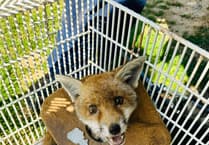THE Dartmoor Pony Heritage Trust has received permission from Natural England to increase the number of ponies at its Bellever site on Dartmoor.
The trust plans to expand the current pony herd from 25 to a maximum of 40 during the summer season.
However, during the winter, they will maintain a smaller stock of 30 ponies on the 82-hectare (202-acre) site.
The trust cited a study conducted by the University of Plymouth that supports their initiative.
According to the study, grazing ponies at Bellever have had a positive impact on the environment by reducing the dominance of purple moor grass.
This reduction has resulted in improved plant and animal diversity, as healthier seedlings are now able to germinate.
Malcolm Snelgrove, chairman of the charity, expressed his enthusiasm for the findings. He believes that the increased number of ponies at Bellever will contribute to the preservation of biodiversity and help address the environmental issues affecting Dartmoor’s landscape.
Malcolm said: ‘The positive impact ponies have made at Bellever is very exciting and should help ensure that suitably hardy ponies of all types and breeds are recognised and appreciated as effective conservation grazers to support biodiversity and tackle some of the factors affecting Dartmoor’s landscape.’
The increase is a departure from concerns earlier this year that there would be a destocking of ponies on the moor.
Concerns arose in April, after Natural England, the body that represents Defra, published a blog post explaining that much of Dartmoor’s Sites of Special Scientific Interest were in decline, despite ‘huge investment’ through agri-environment schemes since the 1980s.
Natural England then proceeded to send letters to the 900 farmers across Dartmoor, outlining strict new grazing regulations and an widespread destocking of the moor.
Because ponies were counted as livestock, there were fears that destocking would disproportionately impact Dartmoor’s ponies, as they would be ‘swapped out’ by farmers for cattle and sheep.
Defra has said that any recommendations or changes to Dartmoor’s farming regulations will now take into account the ‘long-term and sustainable delivery of other priorities such as agricultural production, public access and cultural and natural heritage.’



